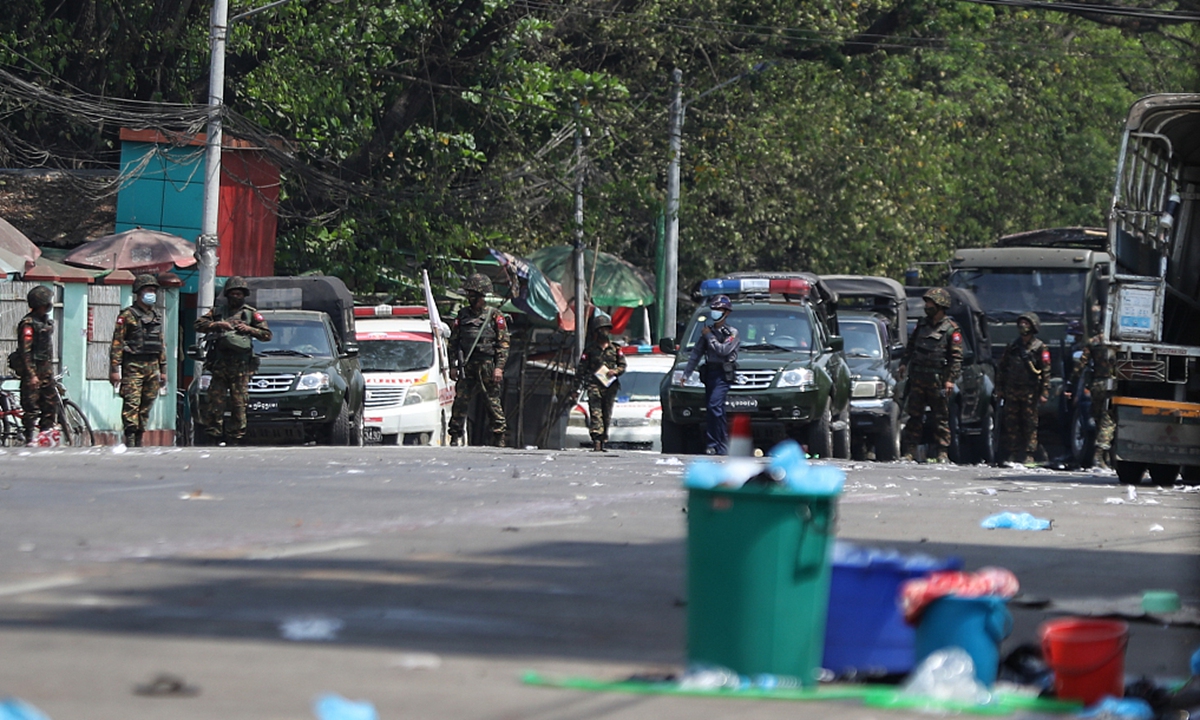
Photo:VCG
Since neighboring Myanmar plunged into a political crisis, China has strictly observed its long-standing diplomatic tradition of noninterference into other countries’ internal affairs and advocacy for peaceful resolution of conflicts. However, many Western governments and political activists have been inclined, not only to interfere in the internal affairs of a sovereign country, but also to pressure others into taking their side.
Those ill attempts appear to have played a role in the apparently premeditated and violent attacks on 32 Chinese companies and a large number of staff in Myanmar on Sunday. The assaults left two Chinese nationals injured and about 240 million yuan ($37 million) in damages. Many in China have understandably made calls to condemn those accountable for the attacks and demand compensation for the losses.
But what requires more attention is the increasing threat to Chinese companies operating in overseas markets by certain Western anti-China forces, as it was exposed in the outrageous attacks in Myanmar.
Two days before perpetrators smashed, looted and burnt the Chinese factories, Kyaw Win, founder and executive of the London-based Burma Human Rights Network, posted on his verified Twitter account a horrifying message to the Myanmar military authority, saying that "if one civilian is killed, one Chinese factory will become ashes."
Win has since explained that the statement was not his but a translation of a poster. Nonetheless, his Twitter account has several posts where he made a series of accusations against China without any trace of evidence.
There is still so much to be investigated, including whether Win and other anti-China forces deliberately instigated those attacks.
However, what has become very clear for a while is that there are many anti-China forces, particularly in Western countries, who have relentlessly smeared Chinese-funded projects overseas under the Belt and Road Initiative (BRI). They have completely ignored the enormous economic and social benefits generated in the host nations and some are sparing no effort to stop them.
Their attempts have so far proven futile, as more countries have joined, and more projects have been rolled out. But like the attacks in Myanmar, they can bring serious threats to Chinese staff and businesses. That should serve as a sober reminder, not just to the Chinese, but also to foreign partners in the BRI to ensure safety of staff and enterprises.
First and foremost, perpetrators of the attacks in Myanmar must be identified, investigated and punished to the full extent of the law. That is not only the right thing to do for justice but could also serve as a stern warning to others who might want to commit similar acts against Chinese nationals and companies in other countries.
It is also critical for our BRI partners to bolster security for Chinese personnel and businesses operating under their jurisdiction, including tracking and stopping third-party attempts to derail projects. Offering a safe environment for business is absolutely essential; otherwise, serious damage could be inflicted. That would also include efforts to timely release information to the public to counter baseless defamation so that people would not be misled by politically motivated propaganda.
At home, as a series of recent key meetings have indicated, China must also bolster security measures to safeguard its development rights, both at home and abroad, at a time when Chinese businesses are facing rising hostility in certain markets. Incorporating security and development in all aspects of the country’s advance is already a stated policy. It is paramount that it is incorporated in safeguarding legitimate development interest overseas.
The author is a reporter at the Global Times. Bizopinion@globaltimes.com.cn

